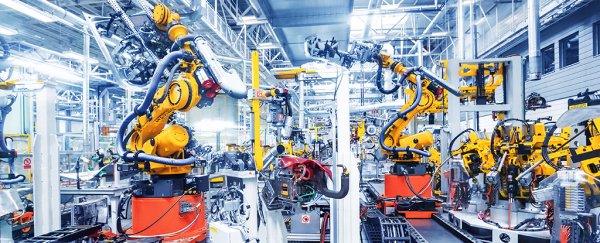They don't sleep, don't need health insurance, and usually don't embarrass themselves at the work Christmas party. Robots might make employers happy, but new research shows just what kind of impact this could have on the structure of the US economy and the shape of its future workforce.
A pair of economists from MIT and Boston University have published a report at the US National Bureau of Economic Research outlining the cost of swapping human labour for programmed machines in areas such as manufacture, agriculture, research and development, and even education.
The results aren't exactly great for workers in those labour markets.
"Robots, in particular industrial robots, are anticipated to spread rapidly in the next several decades and assume tasks previously performed by labour," the researchers claim in their report.
The study examined the steady rise of automation in a number of labour markets between 1993 and 2007, applying a statistical model to predict the overall impact robots have on the costs of human labour.
Each additional robot was determined to reduce employment by 5.6 workers.
Not only that, but for every 1,000 workers, one robot could reduce wages by between one-quarter and one-half of a percent.
Of course, automation is nothing new; swapping manpower for pulleys and levers has been a cause for concern ever since Ned Ludd had a tantrum over a pair of knitting machines in 1779, becoming the namesake for a revolution.
Recent decades have seen a massive rise in the role of automated and intelligent machinery across many industries, with a four-fold increase in robots in the 14 years studied by the economists.
That still doesn't mean we're neck-deep in robots quite yet – there are currently just 1.75 robots for every 1,000 workers, with the number of American jobs permanently lost due to automation estimated to be no more than about 670,000, compared to a total of 145,798,000 jobs currently available in the US.
But some economists predict that figure to multiply another four times by 2025 to 5.25 robots per 1,000 humans, contributing to a potential 3.4 million lost jobs.
Before you get your pitchfork sharpened (by a good old-fashioned human with a whetstone), things might not be all doom and gloom.
For one thing, the figures presented here are the extreme case; the report itself is also just a single study based on a range of assumptions on past and future trends, leaving a lot of room for debate.
Taking a step back to look at the bigger picture, other economists have seen a pattern over the past century that suggests what automation takes away, it gives back in other areas.
Economist Robert Cohen at the Economic Strategy Institute was reported stating last year in Fortune that "cloud computing, Big Data, and the Internet of Things will employ millions of people in new types of jobs".
But this might not be all that comforting to those with skills suited to labour soon to be filled by a robot, nor does it mean jobs won't move around the globe from one economy to another.
No doubt the way money moves within and between nations will evolve as well; earlier this year Bill Gates suggested taxing robots as an alternative to banning them altogether, slowing what could be an increasingly rapid change.
Elon Musk predicts a future where a basic universal wage – kind of a guaranteed income just for being a citizen – might be important for combatting creeping automation.
It seems everybody has a thought on a future where robots will be everywhere, except the robots themselves.
Not yet, at least.
The results have been published by the US National Bureau of Economic Research.
